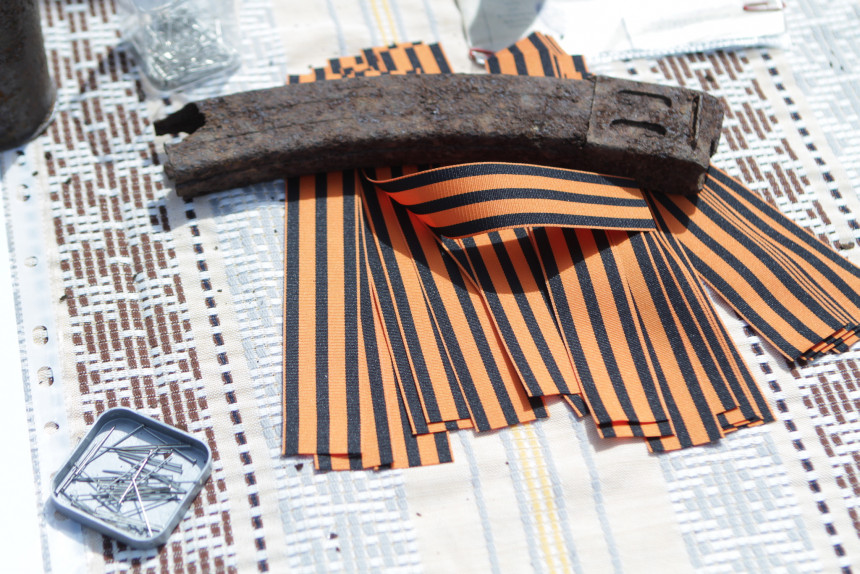Seems like the use of symbols of the Russian occupation forces in Ukraine might not be criminalized

Amendments to the Criminal Law submitted by the Union of Greens and Farmers (Zaļo un Zemnieku Savienība), which would criminalize the use of St. George ribbons and insignia of the Russian occupation forces in Ukraine in public space, were passed to the Saeima committees without objections, but there is no overwhelming support for this initiative.
In response to the Russian aggression in Ukraine and the symbols used by its supporters in public events, ZZS submitted amendments to the Criminal Law to the Saeima. The MPs propose to supplement the provision of the law against the justification of genocide, crimes against humanity, crimes against peace and war crimes with a provision against "the use in public space of symbols used by perpetrators, supporters, initiators of these crimes, including the symbols of armed forces and military equipment".
"The scope of the new legal provision would recognize as unacceptable in public space the use of symbols currently used in the Russian military aggression in Ukraine, such as the letter Z or V, as well as the George ribbon on cars or clothes, expressing a supportive stance and creating associations with military equipment of the Russian Armed Forces," the signatories explain in the annotation of the draft law, who also extend the initiative to cases of desecration of Ukrainian state symbols or aggressive retaliation against expressions of solidarity with Ukraine.
At present, the use of the George ribbons is only controlled administratively. Violation of the existing restrictions can result in a fine of €350 for a natural person and up to €2900 for a legal entity. The amendments proposed by ZZS provide for offenders to be punished by up to five years' imprisonment or temporary imprisonment, or by probation supervision, fines or community service.
In line with the prevailing mood in Parliament and in the democratic world in recent weeks, the draft law was referred to the Saeima Committees without any objections. However, this does not mean that the use of the symbols in question will be criminalized.
For example, Valērijs Agešins, representing Harmony (Saskaņa) in the Saeima Legal Affairs Committee, is in favor of criminalizing the use of the letters "Z" and "V" in the relevant context, but doubts that the same severity should be applied to the use of George ribbons.
"This is a question for the authors of the draft law, how they mean it, and for all the experts who will be called in tomorrow [today]," Agešins said, referring to today's meeting of the responsible Legal Affairs Committee, adding that the draft law would most likely be referred to the Criminal Law Policy Subcommittee.
Jānis Iesalnieks, a representative of the National Alliance (Nacionālā apvienība) who serves on the Criminal Law Policy Subcommittee, also doubts the need to criminalize the use of symbols used by the Russian army in the attack on Ukraine. "It seems to me that liability should be provided for as an administrative penalty. That is the right place to put a ban. We are, after all, not going to describe all the letters of the alphabet, but a general term for the symbolism used by the aggressor could be included," said Iesalnieks.
The politician explains that it would be difficult to include this provision in the Criminal Law, because such a provision could be interpreted very broadly and it would be difficult for the police and the prosecutor to distinguish where someone used the letter "Z" in an attempt to glorify Russian aggression and where - for other reasons.
Juris Rancāns, an MP from the Conservatives (Konservatīvie) serving on the Subcommittee, also supports the inclusion of a similar provision in the Law on Administrative Penalties. "The geopolitical situation in the world is quite extraordinary at the moment. There is a war in Ukraine, started by Russia, with a huge potential for this conflict to spread further. We understand that all these symbols of the Russian historical narrative are part of the information war that is currently taking place on all fronts. In this sense, this draft law looks very timely and necessary, but I would like to hear experts and specialists discuss this," said Rancāns.
A similar discussion is currently taking place in the Czech Republic, which has already criminalized verbal support for Russian aggression in Ukraine.